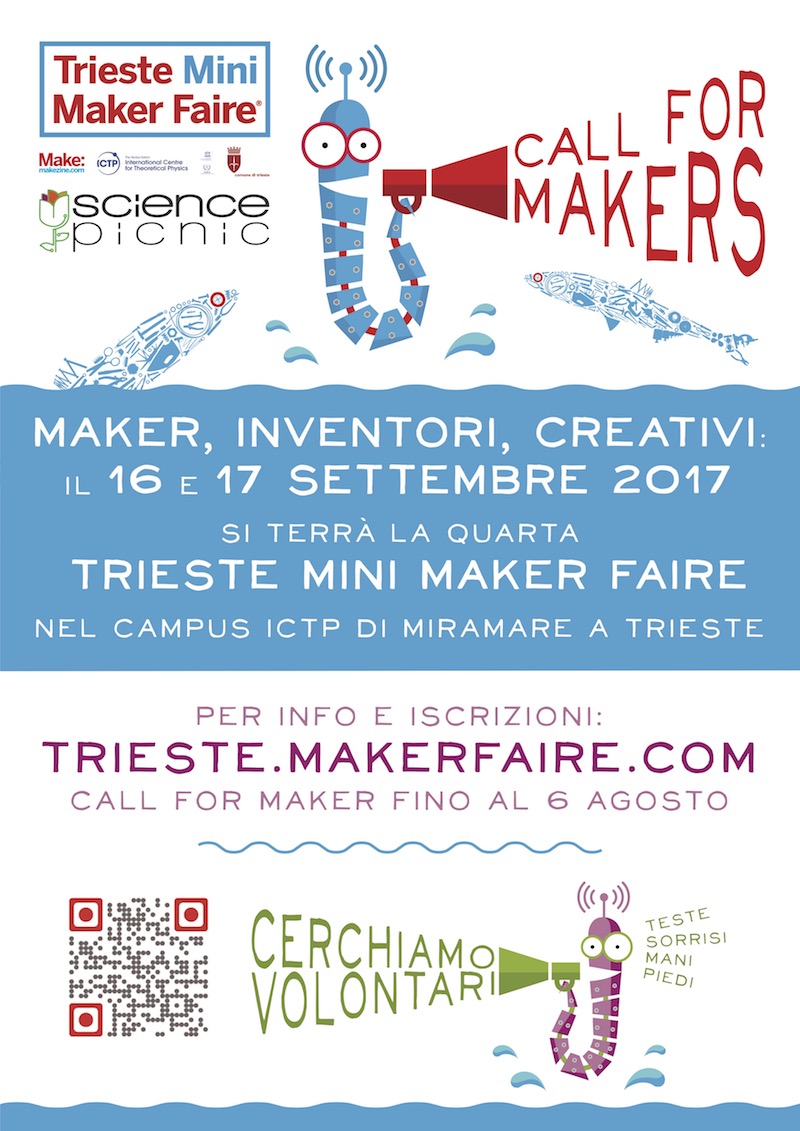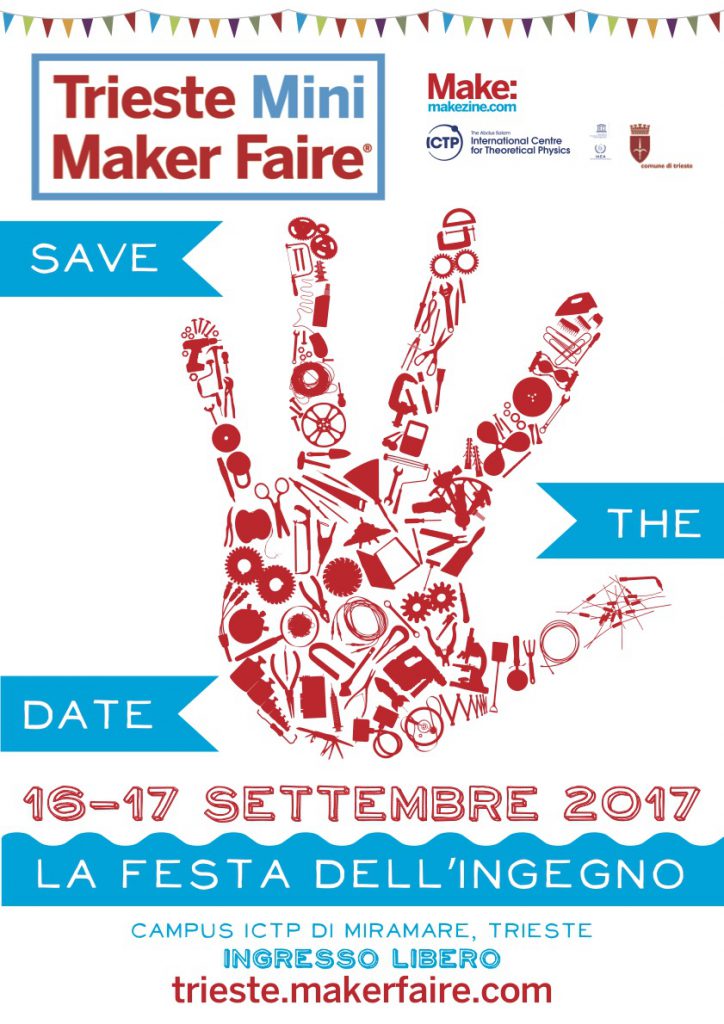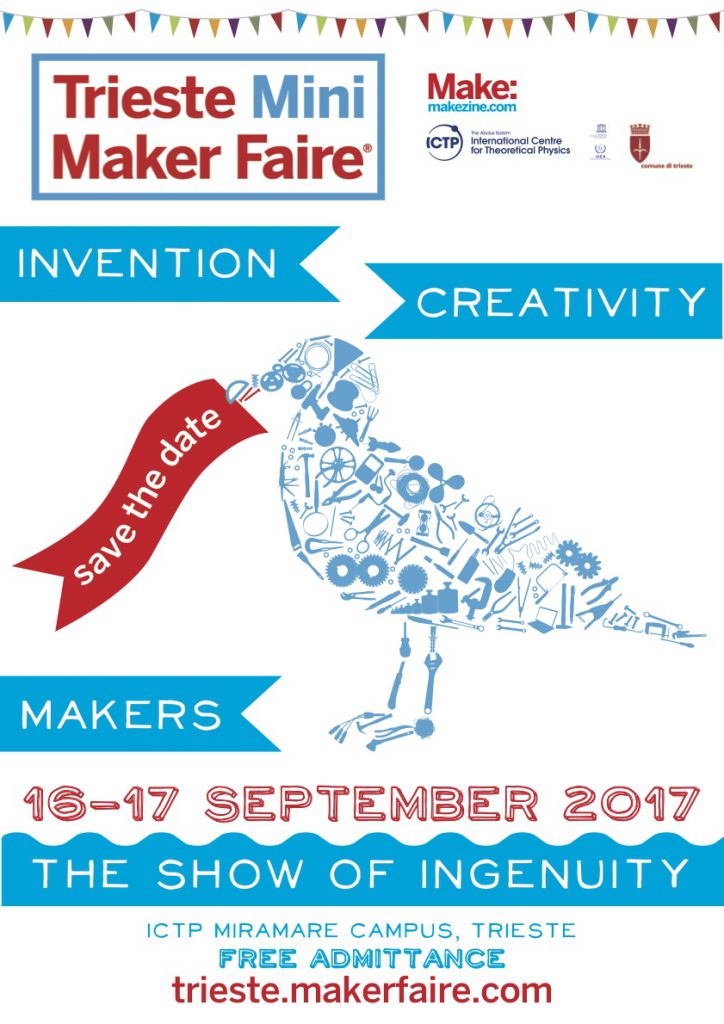Titolo del Posto: 1 posizione, part-time di Assistente Temporaneo per la Didattica ICTP SciFabLab
Organizzazione: The Abdus Salam International Centre for Theoretical Physics (ICTP)
Sede: SciFabLab, Campus ICTP di Miramare, Trieste, Italia
Tipologia del Posto: Special Service Agreement (SSA)
Presentazione Domande: entro mezzogiorno di Venerdì 4 Agosto 2017
Obbiettivi dell’incarico
Sotto la supervisione dello staff della Science Dissemination Unit dell’ICTP, Coordinatori dell’ICTP Scientific Fabrication Laboratory (SciFabLab), l’Assistente Temporaneo per la Didattica scelto,
- dovrà organizzare e svolgere, durante i giorni e gli orari da stabilire preventivamente con i Coordinatori, le attività didattiche per scuole primarie e scuole secondarie di primo grado, che saranno svolte presso lo SciFabLab in collaborazione con il Comune di Trieste;
- sarà responsabile della preparazione delle attrezzature e dell’organizzazione del materiale didattico e dei contenuti utilizzati durante dette attività, nonché della supervisione degli studenti durante le stesse;
- sarà persona di contatto dello SciFabLab verso le altre istituzioni con le quali esistono rapporti di collaborazione per l’organizzazione di attività didattiche ed educative per le scuole.
Compiti Principali
L‘Assistente Temporaneo per la Didattica dovrà svolgere le attività didattiche per le scuole, fino ad un massimo di 6 ore settimanali. Dovrà altresì preventivamente preparare il materiale didattico e le attrezzature necessarie per tali attività.
Il numero di ore di lavoro di un Assistente Temporaneo per la Didattica dello SciFabLab è fissato a 6 ore settimanali.
L‘Assistente Temporaneo per la Didattica sarà inoltre incaricato dell’accoglienza e dell’assistenza a classi e gruppi di studenti e docenti delle scuole del territorio, in caso di visite programmate con anticipo in collaborazione con il Comune di Trieste.
Considerazioni
La programmazione, la calendarizzazione e le prenotazioni delle attività didattiche rivolte alle scuole primarie e secondarie di primo grado saranno gestite dall’Assistente Temporaneo per la Didattica in collaborazione con i Coordinatori dello Scifablab e con il Comune di Trieste e le date e orari delle attività stesse saranno fissate in anticipo in un calendario con scadenza mensile. L’uso del nome, dell’indirizzo e del logo dell’ICTP non è consentito in nessun caso a nessun membro collaboratore, assistente o altro dello SciFabLab, mentre il nome e logo dello SciFabLab potranno essere usati previa autorizzazione dei Coordinatori dello SciFabLab. Data la natura e lo status dell’istituto ospitante (ICTP), nessun membro collaboratore, assistente o altro dello Scientific FabLab potrà vendere nulla né effettuare alcuna transazione o attività commerciale all’interno dello SciFabLab ICTP in nessun momento.
Requisiti richiesti
– Diploma di laurea o titolo equipollente.
– Esperienza di utilizzo delle attrezzature presenti nello SciFabLab (Stampanti 3D FDM, Scanner 3D, Plotter di taglio laser, Plotter da taglio carta, microcontrollori/embedded PC).
– Esperienza di utilizzo di software per modellazione e stampa 3D. Se necessario, l‘Assistente Temporaneo per la Didattica verrà invitato a seguire un periodo di formazione tecnica e/o di sicurezza per l’uso delle attrezzature disponibili presso lo stesso SciFabLab.
– Capacità di gestire gruppi di studenti, attitudine creativa verso la didattica, un’ottima conoscenza della lingua Italiana.
– Precedenti esperienze nella didattica di materie tecnologiche e di fabbricazione digitale e conoscenza della lingua Inglese (parlata e scritta) saranno inoltre requisiti preferenziali.
Durata dell’incarico
L’incarico avrà inizio il 16 Agosto 2017 e avrà la durata di mesi 4 (quattro) fino al 15 Dicembre 2017.
Remunerazione
Durante il periodo di servizio nella tempistica indicata, l’Assistente Temporaneo per la Didattica scelto riceverà la somma di 500 (cinquecento) Euro mensili. Non è previsto nessun altro tipo di contributo o altra remunerazione aggiuntiva o straordinaria.
Modalità di Candidatura
Le persone interessate devono presentare la loro candidatura entro i tempi indicati via e-mail all’indirizzo: personnel_office@ictp.it indicando il loro interesse a partecipare a questa “Richiesta di Assistenza Temporanea per la Didattica presso l’ICTP SciFabLab” e allegando una copia dei loro Curriculum Vitae in PDF completo di dati anagrafici, esperienze lavorative, studi conseguiti, ecc. e qualunque altra informazione ritenuta utile per la loro candidatura. Inoltre l’email dovrà indicare esplicitamente che “Io sottoscritto autorizzo l’ICTP al trattamento dei miei dati anagrafici ai sensi dell’art.13 sulla legge N.196/2003”.
La presenza attiva dei candidati nei social media via facebook, twitter, blog, ecc è gradita e si consiglia di indicarla nel CV.




